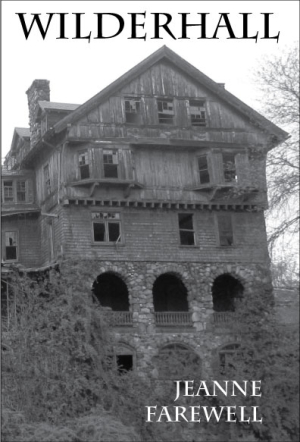Wilderhall
Wilderhall uses drama and show business as stages for a well-crafted, character-driven mystery.
Secrets planted long ago bear tragic fruit for a thespian family in Jeanne Farewell’s entertaining, character-driven mystery, Wilderhall.
Newspaper theater critic Jasper de Vole gets more than he bargained for when a socialite, Winifred Hart, offers him his dream job: writing the official family biography of the Harts. Deceased stage stars Rex and Dora Hart had an even more successful, but troubled, daughter who was an actress, Margot.
As de Vole tries to learn what caused Margot’s nervous breakdown on stage during a performance years before, and the details of her subsequent disappearance, he encounters mysteries, family secrets, and a hornet’s nest of public controversy. Wilderhall is the Hart family home, a great neglected mansion heading for ruin that is perhaps an apt metaphor for Margot’s life and the Hart family legacy.
Though de Vole’s attempt to discover the truth of Margot’s life is at the center of the narrative, Margot herself makes only a brief cameo appearance in the story. She is shown mostly through the eyes and recollections of better-defined surrounding characters, like the prissy, physically unassuming de Vole and a gruff, intimidating housekeeper, Mrs. Plunkett.
The relationship between these two well-drawn characters is a humorous centerpiece of the novel. Plunkett alternately bullies and spoils de Vole. Other relationships are equally interesting and include a budding romance between a darkly handsome Shakespearean scholar and a childhood friend of Margot’s who is lively and handicapped.
Clever, articulate, sometimes even snarky dialogue—a character sums Margot up as “light, bright and trite”—helps keep the story perking along.
References to stage and film titles fill the book, giving it a solid theatrical feel, though not all its historical references are exact. A reference to the moon landing is anachronistic, and the book conveys little else about its 1960s cultural setting.
The novel’s physical settings are vividly described, ranging from the ornate salons of lavish country homes where de Vole is a houseguest to storm-lashed New England coasts.
While de Vole’s quest to uncover the buried family secrets behind what happened to Margot is compelling, his internal struggles are also interesting. He flutters between ambition and insecurity, integrity and envy. When a rival journalist publishes a scandalous story about Margot and a lover, de Vole is both incensed by the article’s crassness and jealous of the scoop.
Such quick and contradictory swings in demeanor show de Vole as slightly absurd, yet also ring emotionally true, making him an engaging if unconventional protagonist.
Wilderhall uses drama and show business as stages for a well-crafted, character-driven mystery. It’s a fast, satisfying read, revealing the destructive nature of secrets and lies and the healing power of truth.
Reviewed by
Gary Henry
Disclosure: This article is not an endorsement, but a review. The publisher of this book provided free copies of the book and paid a small fee to have their book reviewed by a professional reviewer. Foreword Reviews and Clarion Reviews make no guarantee that the publisher will receive a positive review. Foreword Magazine, Inc. is disclosing this in accordance with the Federal Trade Commission’s 16 CFR, Part 255.

